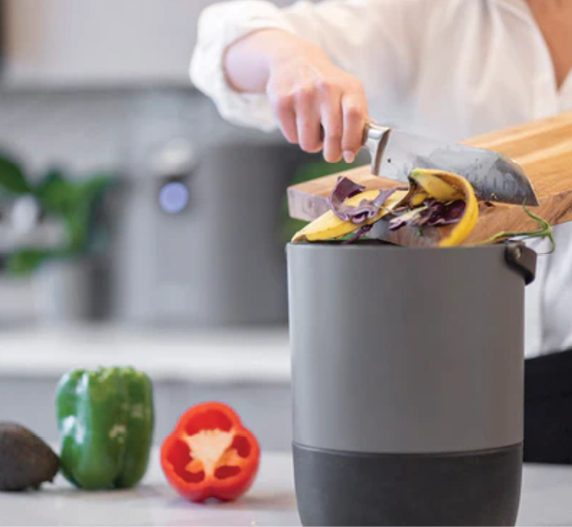After receiving a number of requests from people in the District, council has taken a look at expanding its garbage pick-up program.
According to Jason Bradley, Director of Operations and Infrastructure, the District uses a single truck, picking up solid waste one week, then cleaning the truck out and picking up recycling the next.
If the District were to move to weekly pick-up of garbage, Bradley say a second truck would be needed to handle the extra work load, which would mean the truck would need to be cleaned far more often. “At the end of every day, you’d have to clean the truck to get it ready for recycling, and then you’d still have to get out there and collect solid waste.”
The District does own a second truck, but, he says, it is not really up to the task of running on a day-to-day basis, instead being used to fill in when the main truck is not in service. “It’s just a back-up. I don’t think it would be able to handle the weekly workload again.”
The District is on track to replace the current truck—a 2018 International Packer—in 2029. The estimated cost of that is $380,000.
In addition to the one-time cost of the new truck, another half-time staff person would need to be hired to drive it, plus all the ancillary costs (fuel, insurance, etc), which would add an estimated $108,000 to the cost of garbage and recycling.
An additional cost of weekly garbage pick-up is not something that Bradley wants to see; he’s looking for ways to reduce costs. In 2022, the District made less than $1000 more than 2021 on renting out garbage bins, selling recycling, etc., but spent more than $100,000 extra on solid waste and recycling, for a total deficit in 2022 of $488,232.44, compared to $358,919.06 the year before. Some of those costs came from a one-time clean-up and an additional position at the transfer station that has since been eliminated.
Instead, Bradley has two recommendations.
The first is for people who need more space for garbage than is currently available in the current 65 gallon bins to take a closer look at the additional bins. “It’s a one-time purchase of $150, and $175 per year added to your taxes.”
Mayor Krakowka says there’s been lots of numbers thrown out on Facebook—$300, $500. “It’s here in black and white. It’s $150 one time, and then $175 yearly to have a second garbage bin. That’s very clear.”
Currently the district has 181 bins that are not currently in use. (There are also 203 recycling bins sitting around for people who generate a great deal of recycling.)
Additionally, says Bradley, the District could look at a food cycling program, which has been tried in some locations across the province.
“The FoodCycler Municipal Program is a waste management system that can reduce food waste ending up in landfill by diverting 25 to 50 percent of trash in participating households,” writes Bradley. “The program reduces the impact food waste has on the planet. After a very promising trial residents of Nelson, BC are putting 1600 FoodCyclers to work to help reduce their environmental impact and cut costs on food waste disposal.”
This is an alternative to composting, which can become a wildlife attractant.
Terése Finegan, Director of Economic Development and Tourism, says she’s been testing out one of the units for the last few months. “What you do is put your wet compost—vegetable peels and other food waste—into this unit, which grinds it up and dehydrates it. It comes out as compost, which you can add to your topsoil or donate to the community garden.”
She says there is the option to do a shared cost program. The cost of the unit would be about the same as an additional bin—about $150—but it is an opportunity to reduce waste.
In the end, council made no decision to increase garbage pick-up or the FoodCycler Program.
In October of last year, the city of Nelson, BC, announced it would be purchasing 1600 FoodCyclers to residents of the city. The cost to purchase the machines administer the program is $1,061,440, of which about $700,000 is being covered by a grant.
A FoodCycler is a unit with a bucket inside. The new models have a five litre bucket. Organic waste is placed inside, and the machine grinds and dries the waste, turning it into fertilizer in less than eight hours.
In 2020, the city ran a pilot program with 151 participants. Over the course of three months, about 30,000 litres of food waste, or 15 tonnes, was turned into dirt. That works out to about 187 bags of waste that was diverted from the landfill. (About half the participants composted before participating in the program.)
Of the people who participated, 83 percent said they would recommend it to others. While the devices weren’t perfect (some complained of odour, while others say the machine made too much noise), only two percent said they did not like the solution.
According to the city of Nelson, it becomes a virtuous cycle; less waste means less effort needed to collect garbage, meaning less fuel cost. The conversion to fertilizer means the food doesn’t rot, producing greenhouse gases such as methane. And in Tumbler Ridge, it would mean fewer trucks needed to haul waste to the PRRD landfill, again, reducing fuel costs and costs to the District.
It’s not the only option. Other municipalities across BC pick up wet food waste, but that increases the cost to the District. However, in Nelson, it would have doubled the cost of pick-up, making the FoodCycler a cheaper and more effective option.

Trent is the publisher of Tumbler RidgeLines.

